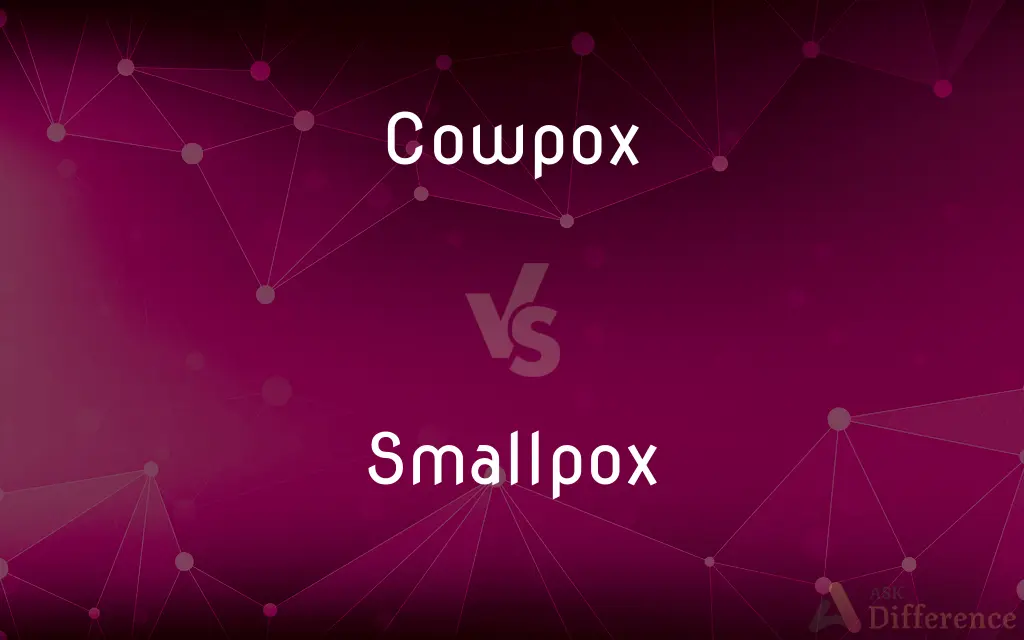Cowpox vs. Smallpox — What's the Difference?
By Fiza Rafique & Urooj Arif — Updated on March 27, 2024
Cowpox is a mild disease in humans caused by a virus that primarily affects cattle, while smallpox is a severe, often deadly, human disease caused by the variola virus.

Difference Between Cowpox and Smallpox
Table of Contents
ADVERTISEMENT
Key Differences
Cowpox is a rare viral disease that primarily affects cattle, occasionally transmitted to humans, resulting in limited, localized skin lesions. Whereas smallpox was a highly contagious and deadly disease in humans, characterized by fever and a distinctive skin rash.
Cowpox infection typically confers immunity against smallpox, a fact historically exploited for vaccine development. On the other hand, smallpox had no treatment and was eradicated through a global vaccination campaign using the cowpox virus.
The cowpox virus is relatively benign, with infections usually resolving without treatment. In contrast, smallpox had a high mortality rate and could cause severe scarring, blindness, and death.
Cowpox outbreaks are now exceedingly rare due to the disease's limited transmission among cattle and from animals to humans. Smallpox, however, was a global scourge until its eradication in 1980, with no natural occurrences since.
Vaccination for cowpox is not common or generally necessary due to its rarity and mildness. Smallpox vaccination, which effectively ended with the disease's eradication, was once a routine part of public health policies worldwide.
ADVERTISEMENT
Comparison Chart
Causative Agent
Cowpox virus (Orthopoxvirus)
Variola virus (Orthopoxvirus)
Primary Hosts
Cattle (occasionally humans)
Humans
Symptoms
Mild, localized skin lesions
High fever, widespread rash
Mortality Rate
Low, generally non-lethal
High, especially in unvaccinated individuals
Prevention
No specific vaccination required
Vaccination (historically using cowpox virus)
Compare with Definitions
Cowpox
Rare in humans, with symptoms including fever and red blisters.
After handling infected cattle, she developed symptoms of cowpox.
Smallpox
A contagious, deadly disease caused by the variola virus.
Before its eradication, smallpox claimed millions of lives worldwide.
Cowpox
Caused by the cowpox virus, a member of the Orthopoxvirus genus.
The cowpox virus was critical in developing the first smallpox vaccine.
Smallpox
Characterized by fever, malaise, and a distinctive rash.
The smallpox rash progresses from macules to pustules over several days.
Cowpox
A viral disease of cows' udders that can spread to humans, causing pustules.
The farmer contracted cowpox after milking an infected cow.
Smallpox
Eradicated in 1980 through a global vaccination campaign.
Smallpox is the first disease to be eradicated by human effort.
Cowpox
Historically important for its role in smallpox vaccination.
Edward Jenner used cowpox in the 18th century to create a smallpox vaccine.
Smallpox
No natural occurrences since eradication, but bioterrorism concerns persist.
Laboratories storing variola virus are heavily secured against potential misuse.
Cowpox
Generally self-limiting and resolves without treatment.
His cowpox lesions healed over a few weeks without any medical intervention.
Smallpox
Vaccination was the primary prevention method.
Smallpox vaccination led to the development of the concept of vaccination.
Cowpox
Cowpox is an infectious disease caused by the cowpox virus (CPXV). It presents with large blisters in the skin, a fever and swollen glands, typically following contact with an infected cow.
Smallpox
Smallpox was an infectious disease caused by one of two virus variants, Variola major and Variola minor. The agent of variola virus (VARV) belongs to the genus Orthopoxvirus.
Cowpox
A mild contagious skin disease of cattle, usually affecting the udder, that is caused by a virus and characterized by the eruption of a pustular rash. When the virus is transmitted to humans, as by vaccination, it can confer immunity to smallpox. Also called vaccinia.
Smallpox
An acute, highly infectious, often fatal disease caused by a poxvirus and characterized by high fever and aches with subsequent widespread eruption of pimples that blister, produce pus, and form pockmarks. Smallpox was eradicated worldwide by 1979 as a result of numerous vaccination campaigns and the virus exists only as a laboratory specimen. Also called variola.
Cowpox
A pustular, eruptive skin disease of cattle caused by an Orthopoxvirus, with lesions occurring principally on the udder and teats. Human infection may occur from touching cows, and gives immunity to smallpox.
Smallpox
(disease) An acute, highly infectious often fatal disease caused by Variola virus of the family Poxviridae. It was completely eradicated in the 1970s, but still exists in laboratories. Those who survived were left with pockmarks.
The Europeans brought new diseases such as smallpox, measles, dysentery, influenza, syphilis and leprosy.
Cowpox
A pustular eruptive disease of the cow, which, when communicated to the human system, as by vaccination, protects from the smallpox; vaccinia; - called also kinepox, cowpock, and kinepock.
Smallpox
A contagious, constitutional, febrile disease characterized by a peculiar eruption; variola. The cutaneous eruption is at first a collection of papules which become vesicles (first flat, subsequently umbilicated) and then pustules, and finally thick crusts which slough after a certain time, often leaving a pit, or scar.
Cowpox
A viral disease of cattle causing a mild skin disease affecting the udder; formerly used to inoculate humans against smallpox
Smallpox
A highly contagious viral disease characterized by fever and weakness and skin eruption with pustules that form scabs that slough off leaving scars
Common Curiosities
How are cowpox and smallpox related?
Both are caused by viruses in the Orthopoxvirus genus, with cowpox historically used in smallpox vaccination.
What is cowpox?
Cowpox is a viral disease affecting cattle and occasionally humans, characterized by skin lesions.
What are the symptoms of cowpox?
Symptoms include fever and red blisters, mostly localized.
Is there a vaccine for cowpox?
No specific vaccine for cowpox is necessary or commonly used.
What causes smallpox?
Smallpox was caused by the variola virus, affecting only humans.
What were the symptoms of smallpox?
Symptoms included high fever and a widespread, distinctive rash.
How did cowpox contribute to the eradication of smallpox?
Cowpox was used to develop the first vaccine, which led to smallpox eradication.
Can humans get cowpox?
Yes, but it's rare and typically mild, with humans contracting it from infected animals.
How was smallpox eradicated?
Through a global vaccination campaign using the cowpox virus and later the vaccinia virus.
Are cowpox and smallpox the same?
No, they are caused by different viruses and have distinct characteristics and severity.
What happens if you get cowpox?
Most people recover without treatment after a few weeks.
Can cowpox still be contracted today?
Yes, but it's very rare and typically not severe.
Why is cowpox less dangerous than smallpox?
Cowpox causes milder symptoms and is less contagious compared to the often deadly smallpox.
How contagious was smallpox?
Smallpox was highly contagious and could be spread through direct contact or respiratory droplets.
What was the smallpox vaccine made from?
The smallpox vaccine was originally made from the cowpox virus.
Share Your Discovery

Previous Comparison
Fishery vs. Aquaculture
Next Comparison
Multinomial vs. PolynomialAuthor Spotlight
Written by
Fiza RafiqueFiza Rafique is a skilled content writer at AskDifference.com, where she meticulously refines and enhances written pieces. Drawing from her vast editorial expertise, Fiza ensures clarity, accuracy, and precision in every article. Passionate about language, she continually seeks to elevate the quality of content for readers worldwide.
Co-written by
Urooj ArifUrooj is a skilled content writer at Ask Difference, known for her exceptional ability to simplify complex topics into engaging and informative content. With a passion for research and a flair for clear, concise writing, she consistently delivers articles that resonate with our diverse audience.














































